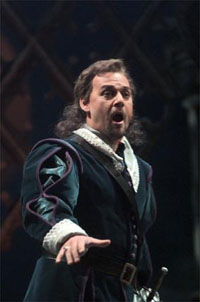Darío Volonté
born 1 September 1963 Buenos Aires
In RA format
In RA format
In RA format
In RA format
The following article by Mayra Pertossi (1999) is a very good presentation of Darío Volonté:
He has gone from being a target of British bombs during the Falklands War
to being in the spotlights of some of the world's most famous opera houses.
Tenor Darío Volonté, 35, is a survivor of the 1982 sinking of the General
Belgrano when Argentina and Britain went to war over control of the South
Atlantic islands.
"I leaped into a life raft" as a British torpedo slammed into the warship,
Volonté told Reuters. "When I jumped I fell into the raft, but all the others
I saw fell into the water and froze to death."
Now the Falklands War is but a memory for Volonté, who has fashioned a
promising new career in opera: in 1997 and 1998, he won over demanding
Italian aficionados with his interpretations of Il trovatore and Tosca.
This year he won Argentina's heart with his rendition of Aurora, a piece
local critics say is a load of operatic rubbish but which fans flames of
Argentine patriotic favor by exalting the South American nation's
independence from Spain.
The Falklands War and opera are intertwined for Volonté. "Music, living in the
moment and honoring life, for me, is a way to honor those who didn't
survive" he said.
Born into a humble family in Entre Rios, 250 miles north of Buenos Aires,
Volonté discovered his vocation by chance.
"I discovered I had the right voice when I was 17 while listening to Plácido
Domingo singing on TV when he was on an Argentine tour. [It was in 1981 when
Domingo sang Otello at the Teatro Colón.] I started imitating him and I saw I
was able to imitate him, singing the high notes he sang... that's when I
realized I had a voice for singing", he said.
A year later he was sent to war with the British in the engine room of the
ill-fated General Belgrano. That is when he witnessed most of his fellow sailors die, and years later he
dedicated his rendition of the Argentine national anthem sung in Aurora to
his fallen comrades. He sang the anthem on 10 June, Malvinas Day in
Argentina (Malvinas is the Spanish name of the Falklands), at the Teatro Colón in Buenos Aires.
It was upon his return from the war, in 1983, that Volonté met his first
operatic maestro. "I started singing in church choirs, and that's where I met
maestro José Crea, a baritone at the Teatro Colón, who tutored me for
free: He was my first patron, the first to help me sing, teach me technique.
I studied with him for years", Volonté said.
"This is like a calling for me, I never thought I'd make a living from
singing", he added.
Volonté credits his day job of twelve years as a moving van driver for giving
him the brawn that aids his performances. His next break came in 1994 at his
audition at the renovated Teatro Avenida in Buenos Aires, where he was
cast as a tenor in zarzuela.
His subsequent performances with the Ópera de Buenos Aires helped by late 1997 to
launch his international career in Europe, where he sang in Tosca, Il
trovatore, Beethoven's Ninth Symphony or I cavalieri di Ikebù by Zandonai,
among other works.
The tenor's renditions at Turin's Teatro Regio and Trieste's Teatro Verdi in Italy,
the Nice Opéra in France and the Wexford Festival in Ireland, as well as in
Zürich and Tokyo, were critically acclaimed. After being so widely praised, Volonté returned to Argentina in 1999 to
undertake the greatest challenge of his career singing Aurora at the Colon.
He played Mariano, one of the leaders of the Argentine revolution of May
1810 that ended the Spanish rule of the South American Viceroyalty.
It was the first time in the Colón's history that an Argentine singer encored an aria. It was the "Canción a la bandera" in
Aurora. "Singing at the Colon was a moving experience. It was an especially
powerful moment for me to sing the anthem and think of my friends who died in the Falklands, because that's what the flag represents for me
and anyone who fought in the war," Volonté said.
Volonté plans to cut a CD of Argentine patriotic songs that will be
distributed free to schools and sold in record stores. Part of the proceeds
will go to veterans of the Falklands war.
Since June, Volonté is in Argentina. He sang Rigoletto at the Teatro
Argentino in La Plata, and many concerts throughout the Argentine Republic. One of
them, in Salta province, was heard by an audience of 25,000. Wherever he
goes, on TV or in radio interviews he is asked to sing "La canción a la bandera".
Volonté went on to sing at La Scala, in Rome, Parma, Palermo, Catania, Lecce, Florence, Naples, Genova, at the festivals
in Macerata and Torre del Lago, in Washington, Cincinnati, Pittsburgh, San Diego, Mannheim, Berlin (both Staatsoper and Deutsche Oper), Essen,
at the Bregenz Festival, in Seoul, São Paulo, Madrid (Teatro Real), Sevilla, Palma de Mallorca, Las Palmas or Bilbao. His operatic
career petered out in the early 2010s, then he went on for another few years as a pop singer and even had his own band.
Reference: Wikipedia
I wish to thank Roberto Falcone for the recordings (Tosca, Trovatore 1) and the Pertossi article.
I wish to thank Thomas Silverbörg for the recordings (Turandot, Trovatore 2).
|
